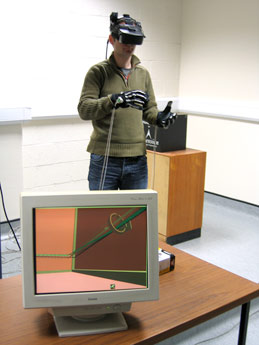Virtual
Reality Cable Harness Design

Dr Brian Gilhooley, CEO of Virtual Interconnect
stated that ”the long term links with
the James Watt Institute have been very beneficial
to our company and significantly helped our
process development". |
The engineering industry is currently in the transition
from 2D to 3D and new technologies are required
to take advantage of this changing landscape. The
increasing competition from low labour rate economies
has also led to UK companies requiring new and innovative
products to maintain their position in a global
marketplace. The use of virtual reality (VR) and
CAD are key technologies, but also require significant
development in this area.
Virtual Interconnect Ltd (VI) supply cable harness
designs to major OEMs; providing models, expert
advice and employee participation in testing virtual
reality cable harness design prototypes.
Acknowledging the changes taking place in the engineering
industry, VI wanted to undertake a research project
that would combine traditional engineering skills
and computerised processes to exploit the emergence
of “whole product” modelling and translate
wire harness design onto a more professional level.
Research in the James Watt Institute for High Value
Manufacturing at Heriot-Watt was aimed at evaluating
VR and CAD Interfaces within conduit routing for
creative design. Work was carried out on industrial
product data files to ensure that the research was
applicable to industry. Human factors/functional
performance experiments were applied to determine
how the VR and CAD interfaces affected design quality
as well as giving a deeper understanding of how
the technologies influence the design methods employed
and the associated solutions.
Using statistical correlations a number of cause
and effect relationships between the categorisations
applied to the design tasks were determined and
gave a detailed and, for the first time, non-intrusive
insight into how the design process is carried out
as well as how certain aspects of the virtual environment
impacted on this.
The project has significantly increased the capability
of VI, having developed their own circuit simulation
software which integrates closely with existing
engineering software; providing a robust means of
testing circuits, evaluating faults and driving
design workflows. The success of the project has
led to VI engaging with the University of two Engineering
Doctorates and further projects to extend the company’s
circuit simulation package.
The results of this work have led to the research
team at Heriot-Watt being invited to present their
work to three major car companies in Detroit and
Chairing the 1st International Virtual Manufacturing
Conference in Alexandria, Virginia, which was attended
by all of the major Virtual Manufacturing research
groups in the USA. This is an excellent achievement
that highlights the relevant industry focused research
that Heriot-Watt produces.
The work has led to industrial partnerships with
companies such as Agilent, BAE SYSTEMS Avionics,
BAE SYSTEMS Naval Ships, JCB, NCR, FMC Kongsberg
Energy Systems and Rolls-Royce. After observing
this and other VR work, Rolls-Royce (Bristol) Mechanical
Engineering Department invested considerable sums
in their own VR facility including the use of haptics
for assembly analysis.
For more information contact:
Jim Ritchie
j.m.ritchie@hw.ac.uk
0131 451 4364
www.mec.hw.ac.uk/research/robotics.htm |